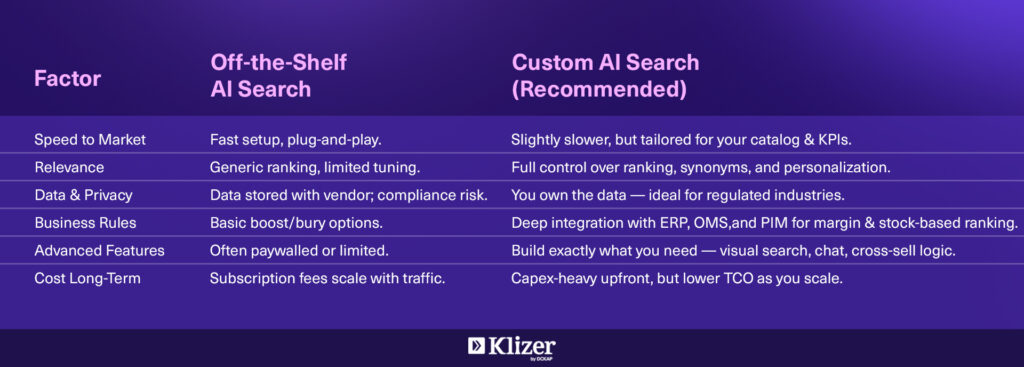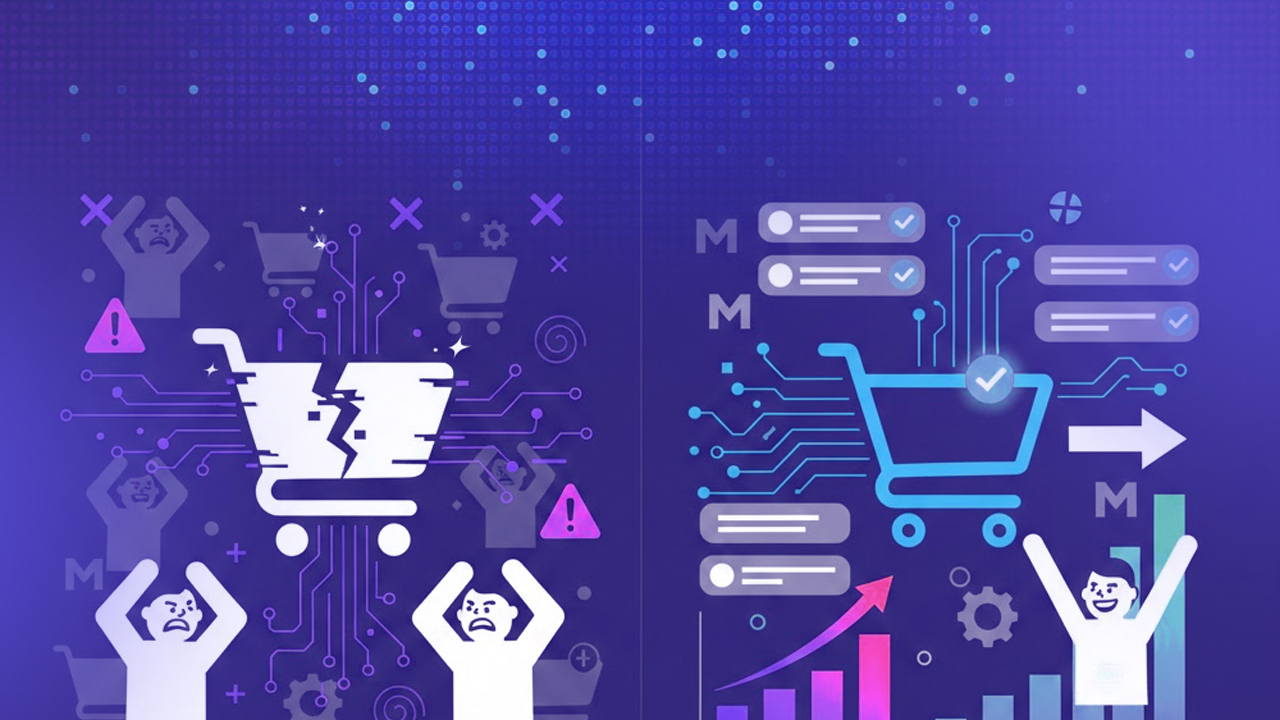How many times have you visited an online store and left because the search functionality didn’t make shopping easier for you? This has happened a lot with us, just like you.
As shoppers, we are always in a hurry and expect fast, accurate, and personalized search results. The traditional keyword-based search kills this momentum, which makes us leave the website.
Studies show that the majority of consumers in the United States (78%) and globally (72%) are less loyal to a brand when it’s hard to find what they want on a website. This is where AI search for ecommerce comes in.
By meeting the consumers’ demands, it helps businesses deliver personalized recommendations and faster product discovery, and ultimately, drives conversions and more loyalty.
Let’s look into it more deeply.
ON THIS PAGE
Why is there a need for AI search for ecommerce
eCommerce businesses aren’t same as what they used to be. Neither are shoppers or shopping behavior. This calls for more advanced search options who can help customers without causing delays. Let’s see some examples:
- Keyword search breaks on natural language: “phone for low-light travel photos” or “eco-friendly detergent for hard water” lack exact keyword matches but have clear intent. This breaks the traditional searches even if the SKUs are there. AI ecommerce search solves this problem.
- Catalogs are complex: SKUs vary by size, fit, voltage, compatibility, pack size, and region. AI ecommerce site search and its ability to locate structured attributes makes these aspects searchable.
- User tolerance is low: Poor ranking, zero-results pages, and brittle filters push shoppers away, especially on mobile where most of the current shoppers shop. AI powered ecommerce search re-ranking blends textual relevance with click-through, add-to-cart, margin, and inventory signals to keep results useful.
- Queries are multimodal: Today search is not just with words. Shoppers can paste a URL, upload a photo, or say “like this but shorter.” AI search for ecommerce fits everything including text, image, and (increasingly) voice.
- Discovery is moving off the storefront: Generative interfaces (chat, AI Overviews, shopping agents) change where and how discovery starts, so your data must be AI-readable (clean attributes, rich descriptions, structured feeds) to work with top AI-powered search tools for ecommerce USA 2025.

Benefits of AI Search for eCommerce
Smarter AI ecommerce search helps customers find exactly what they are looking for without getting frustrated. Best AI-powered ecommerce search solutions ensure maximum efficiency and relevance.
But this is not where the benefits of AI ecommerce search end. Let’s take a look at them here:
- Personalized Experience: AI ecommerce site search analyzes browsing history and preferences to give personalized product recommendations.
- Smarter Site Search: Features like semantic search, visual search, and natural language processing enable shoppers to discover products faster.
- Higher Conversions: Customers are able to find what they want quickly, reducing drop-offs and boosting purchases.
- Stronger Retention: Relevant results and recommendations keep customers engaged and loyal to the brand.
- Deeper Insights: Real-time analytics give businesses a clearer picture of customer behavior.
- Efficient Operations: AI-powered ecommerce search automates tasks like writing product descriptions and managing inventory.
- Lower Bounce Rates: Smooth search experiences keep visitors on the site longer.
- Mobile-Friendly: Voice search and location-based personalization create better experiences for mobile shoppers.
Important Features to Consider While Building AI Search for eCommerce
Every new feature on your online store should make the shopping journey smoother. An efficient AI-powered ecommerce search understands the buyer’s intent, adds a touch of personalization, and makes shopping easier than ever.
Here are some key features that help you achieve this:
- Natural Language Processing (NLP): Shoppers don’t type perfect keywords. They can use questions, slang, or even incomplete words. NLP helps you ensure that the AI ecommerce site search returns correct results by understanding what the buyers really want.
- Semantic Search: This helps you go beyond traditional search that matches keywords and understand the context. For example, if the buyer searches for “running shoes for flat feet”, it should show relevant products, not every “shoe” in the catalog.
- Personalized Recommendations: AI ecommerce search should be able to learn from shoppers’ browsing history and buying behavior. This way, each shopper gets results and suggestions that are best suited for them. This in turn, boosts satisfaction and conversions.
- Visual Search: Today, customers want to upload a product photo or snap one to find similar products. Having visual search embedded in your AI search engine makes product discovery faster and more accurate.
- Voice Search: Often, shoppers search by speaking. AI search for ecommerce should be able to handle queries like “show me red dresses under $100” and return the right results to maximize conversions and sales.
- Real-Time Suggestions & Autocomplete: Shoppers today don’t really love to type a lot. Smart autocomplete should suggest products, categories, or popular searches to help save time.
- Context-Aware Search: AI powered ecommerce search should be able to adjust results based on location, device, promotions, or season.
- Error Tolerance (Spell Check & Synonyms): Two words could mean the same thing, or shoppers can also type wrong spellings, but it shouldn’t lead to blocked or wrong results.
- Data-Driven Insights: The system should show what people search, where they drop off, and what converts. These insights will help businesses improve product listings and marketing for better results.
- Scalability & Speed: Search has to return results quickly, even during peak holiday traffic or high surge. A scalable AI ecommerce site search ensures the store doesn’t slow down during high traffic times.
- Multilingual & Multi-Currency Support: Global stores need a search that works across languages, currencies, and regions.
- Security & Privacy: Since AI search uses customer data, it must follow standards like GDPR, CCPA, or HIPAA. That builds trust and keeps data safe.

AI Search for eCommerce Use Cases
AI-powered ecommerce search is not the same for all businesses. B2B and B2C buyers come with very different expectations. In B2B, speed, precision, and support for bulk or repeat orders are non-negotiable. In B2C, it’s all about helping customers discover products they didn’t know they wanted, making the journey smooth, and keeping it personal every step of the way.
For Enterprise B2B
B2B customers are professionals who know exactly what they need. They specify technical specs, part numbers, or large bulk orders. AI ecommerce search makes this complex buying process smoother by:
- Part Number and SKU Search to quickly match exact part numbers, product codes, or SKUs, even with typos or incomplete inputs.
- Catalog Navigation that helps buyers sift through thousands of SKUs and find relevant products with advanced filters and context-aware search.
- Bulk Ordering that suggests complementary products or allows easy reordering of large volumes based on purchase history.
- Role-Based Personalization that delivers different search results or pricing based on buyer roles, contract terms, or negotiated deals.
- Integration with ERP/CRM connects with back-end systems to show live inventory, contract-based pricing, and account-specific discounts directly in search results.
For Enterprise B2C
B2C shoppers browse, compare, and buy fast — which means the experience has to be smooth and engaging from start to finish. AI-powered ecommerce search makes that happen by:
- Personalized Product Discovery: Showing shoppers exactly what they’re likely to buy next, based on what they’ve browsed, clicked, or purchased before.
- Visual & Voice Search: Letting them snap a picture or use voice to find products instantly, no typing required.
- Smart Suggestions & Autocomplete: Predicting what they mean as they type and surfacing trending products, popular categories, or current offers right away.
- Context-Aware Recommendations: Tweaking results based on where they are, what device they’re using, what season it is, or which promotions are live.
- Dynamic Merchandising: Highlighting in-stock, trending, or higher-margin products — keeping results relevant while helping drive more revenue.
- Post-Purchase Retention: Keeping shoppers coming back with AI-driven cross-sells, upsells, and personalized suggestions after checkout.
How to Integrate AI Search in your ecommerce business
Integrating an AI powered ecommerce search engine into your ecommerce store can involve using ready-made top AI-powered search tools for ecommerce USA 2025 or going for custom AI development to fit unique business needs.
1. Define Your Goals
Decide what you want AI search for ecommerce to achieve. It can be better product discovery, higher conversions, lower bounce rates, or personalized shopping. Having clear goals will guide whether you need an off-the-shelf solution or a custom-built engine.
2. Decide Between Off-the-Shelf vs. Custom AI Development for eCommerce
- Off-the-Shelf Solutions are faster to set up, often with pre-built integrations for common platforms (Magento, Shopify, Adobe Commerce). They are good for businesses with standard needs.
- Custom AI Development for ecommerce is Ideal for enterprises with complex catalogs, B2B workflows, or industry-specific requirements. Custom AI ecommerce search can be built to integrate deeply with ERP, CRM, or other legacy systems, and it allows complete control over features like role-based pricing, multilingual support, or advanced product filtering.

3. Prepare and Clean Your Product Data
For an AI ecommerce site search to work well, your product catalog must be clean and structured. Standardize product names, descriptions, attributes, and images. Add metadata and synonyms so AI understands multiple ways customers might search for the same item.
4. Integrate with Existing Systems
Whether you use a ready-made tool or a custom solution, ensure integration with your ecommerce platform, ERP, CRM, and inventory management. This ensures real-time updates for stock, pricing, and accounts.
Take-home Message
Implementing AI search for ecommerce is no longer a luxury—it’s a necessity for any business that wants to stay competitive and deliver exceptional shopping experiences. By leveraging AI ecommerce search, AI ecommerce site search, and AI-powered ecommerce search, businesses can offer personalized recommendations, faster product discovery, and smarter search results that drive engagement, conversions, and customer loyalty. Whether using off-the-shelf tools or opting for custom AI development, the best AI-powered ecommerce search solutions ensure your store is prepared for today’s demanding shoppers. Investing in the top AI-powered search tools for ecommerce USA 2025 empowers your business to turn search into a strategic growth engine and stay ahead of the competition.










